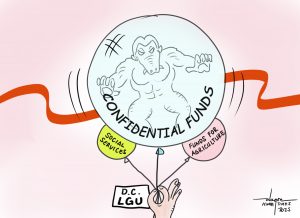That Davao is a showroom to the world as declared by political and business leaders during the many investment and other related conferences in the city in the past three years is indeed for real.
We have the primary resources that can attract potential local and foreign investors. We have government leaders that have shown capabilities to create policies that make the city conducive to investments. And most of all we have well-educated and skilled work force ready to take on jobs that may be required by new businesses that will locate in this southern Philippine metropolis.
Admittedly though, the city still has a lot of things, more specifically natural resources, that could become strong enticements for investors in tourism-related businesses, which are still waiting to be discovered and tapped. And we are referring to some potential tourist attractions that are hidden in the upland areas of Davao City that can best be made to be the alternative offers Davaoenos can give in lieu of the city’s lack of beautiful beaches in its jurisdiction.
In other words, what the city does not have on its shorelines there are plenty in the fastness of its remaining forest lands. Some of these include waterfalls, vantage areas to see some of the city’s panoramic views, challenging rapids for the adventurous, and some very ideal game hunting sites.
And if the declaration by government that the city’s so-called “last frontiers” the likes of Paquibato, Toril and Marilog highlands, are already free from the clutches of the communist insurgents, then there will be no more stopping the journey towards developing the upland natural resources into potential major money earners for the city.
Besides, it is common knowledge that Davao City has all the basic services that are necessary to convince investors to put in their capital here and the assurance that whatever businesses they intend to locate in the city will continue operating even on a 24-hour basis, and that they will never be isolated from any of the intended markets for their products and services.
This is so because Davao City has stable supply of quality power, a massive reservoir of one of the world’s best quality water, and the strong presence of communication facilities and road infrastructures that can make mobility much easier and safe.
But then, again, the city being a “showroom” to the world is not the end in the tortuous highway to development. It is only the means for the city to attain its desired level of socio-economic aspirations.
We believe that Davao City, in terms of resource utilization, must match it with policies that are business-friendly. Its officials must also be well aware of the campaign of former city mayor and now President Rodrigo R. Duterte not to make it hard for businessmen to process their licenses and other operating permits. That is, that their awareness of the President’s admonition must be translated to action not just kept it hidden inside their brains.
And by “business-friendly” policies of the city we do not mean that such should be used to approve even businesses that, sooner or later, will destroy the city’s environment and in the long-run, the businesses of the investors and eventually the lives of people in the communities.
Of course we have the top guy at the Davao City Investment Promotion Center (DCIPC) once proudly claimed that the “business-friendly” policies of the city are already in place. The DCIPC executive even further said that the policies are being “emulated across the country.”
We can only hope that the DIPC honcho was not raising his own bench and the very policies that he is banding around are not mere documents but are already put in actual practice.
Talking of capable city officials we are very well aware that the present crop led by Mayor Inday Sara Duterte-Carpio and Vice Mayor Basti Duterte, the councilors of the city’s three districts, and the various department and division heads at City Hall, relatively belong to the younger generation.
They are sworn to serve the people of the city. As such they are servants of the people. There is no argument therefore, that holding their respective positions also gives them substantial powers with which they are to carry out their duties. And as a line in a famous movie goes, “With huge powers comes great responsibilities.”
Being entrusted by the electorate and the bureaucracy of such huge powers these officials of the city are expected to exercise their powers in the service of their community and their constituents. They are not in any way expected to use the powers to take advantage of what they might wrongly consider as “perks” in their position to the detriment of the people and the community in general.
On this vein we can only pray and hope that for the elected officials they will do what is necessary to fulfill the covenant they have forged with the people when they presented themselves to become their servant leaders.
As for those who were appointed we wish that they can make good their commitment to do with their best the carrying out of the responsibilities attendant to their respective positions of leadership.


